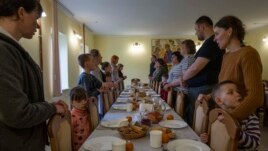13 April 2022
A quiet monastery in the western Ukrainian village of Hoshiv has become a large playground for children. They and their families all had to leave their homes because of the war with Russia.
The Greek Catholic church of the Sisters of the Holy Family is about 100 kilometers from Lviv. The nuns there have given refuge to about 40 people fleeing fighting with Russian forces in eastern and central Ukraine.
The sound of birds and prayers are calming for 59-year-old Ryma Stryzhko, who fled from Kharkiv. "It seemed that the planes were flying in the middle of the house. And you could hear the sound of bombing," she said. "After what we saw, (the monastery) is a paradise."

Internally displaced people make prayers before eating dinner, at the Hoshiv Women Monastery April 6, 2022. (AP Photo/Nariman El-Mofty)
The monastery was built after Ukraine's independence in the early 1990s. The previous monastery in the village had been closed by communist officials when the area was part of the Soviet Union. The nuns were sent to prisons in Siberia.
"All our prayers are now focused on peace in Ukraine, for our soldiers, for those innocent people who died, who were murdered," said Sister Dominica, the head nun.
Before the war, the 17 nuns led a peaceful life. In addition to their religious work, they grew vegetables, made their own food and painted. Now, they play with young children and provide support to the mothers. They also cook daily for the guests.
When the Russian invasion of Ukraine began, the nuns told local officials they could house up to 50 people.
Many of the children who are now laughing and hugging the nuns arrived traumatized.
"This is a new place for them. They came from cities where (there is shooting)" and bombing, Sister Dominica said.
Even in the monastery, the nuns still get air raid notices on their phones. They warn the rest of the guests by ringing the monastery bells. It is a less traumatic sound than the loud sirens in the cities. Then the nuns lead the guests to an underground area.
But even when there are no sirens, children happily use the large underground space.
"We play and read prayers," said Rostyslav Borysenko. The 10-year-old boy fled Mariupol with his mother.
Borysenko's mother is still waiting for news of relatives and friends who could not flee Mariupol.
Although the families are thousands of kilometers from most of the fighting, discussion at the dinner table mostly centers around the war.
While the families eat in the dining room, the nuns eat separately in the library. They sit at a long table under a painting of Jesus Christ's Last Supper. Among them is 44-year-old Sister Josefa, who fled a Kyiv monastery on the first day of the war.
"It's hard to leave the place you lived," she said. "Although I can live here ... my heart is there. And I'm waiting to go back."
I'm Dan Novak.
Dan Novak adapted this story for VOA Learning English based on reporting from The Associated Press.
____________________________________________________________________
Words in This Story
monastery — n. a place where monks live and work together
nun — n. a woman who is a member of a religious community and who usually promises to remain poor, unmarried, and separate from the rest of society in order to serve God
paradise — n. a very beautiful, pleasant, or peaceful place that seems to be perfect
focus— v. a main purpose or interest
traumatize — v. to cause to become very upset in a way that often leads to serious emotional problems
siren — n. a piece of equipment that produces a loud, high-pitched warning sound